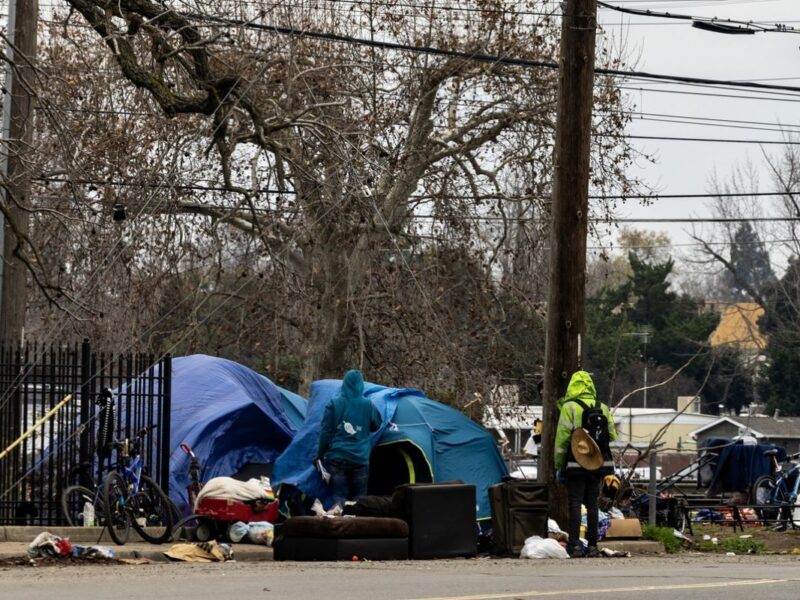Republicans in Congress are trying to make it easier to evict renters by removing a pandemic-era law that requires landlords to give their tenants a 30-day notice to vacate.
The efforts come as eviction rates continue to climb across the country.
As of September 9, more than 1 million evictions had been filed in the ten states and 34 cities tracked by Princeton University’s Eviction Lab. According to the data, cities like Minneapolis, Minnesota; Las Vegas, Nevada; and Gainesville, Florida, all show eviction rates at least 50% greater than their pre-pandemic average.
“Rents are far higher than what the lowest-income and most marginalized renters, including seniors, people with disabilities, and working families, can spend on housing,” National Low Income Housing Coalition CEO Diane Yentel told the House Financial Services Committee during a hearing on December 6. “Despite the clear and urgent need, Congress only provides housing assistance to one in four eligible households.”
One of the bills discussed during the December 6 hearing was House Resolution 802, also known as the “Respect State Housing Laws Act.” It seeks to remove the 30-day notice to vacate requirement from the federal CARES Act, a bill signed by former president Donald Trump in March 2020. H.R. 802 is sponsored by Rep. Barry Loudermilk, a Republican from Georgia.
The 30-day notice to vacate requirement was instituted as part of a federal moratorium on evictions during the pandemic.
The Department of Housing and Urban Development has made strides to make the policy permanent for federally assisted affordable housing programs. However, some housing providers argue the policy is no longer warranted because the pandemic has ended, and it has increased the cost of operating their rental businesses.
Arianna Royster, president of Washington, D.C.-based property management company Borger Residential, testified at the hearing that the 30-day notice to vacate policy adds “confusion to the eviction process established by states…which causes additional stress on housing providers and renters.”
Royster added that the White House’s initiative to federalize landlord-tenant laws and tackle so-called “junk fees” like service and application fees is also driving up the cost of doing business for landlords.
“Rental markets vary widely across the country, which is why local solutions tailored to individual markets are most appropriate, and much like our concerns about the CARES Act notice to vacate requirement, practical implementation challenges and unintended consequences would result from expanding federal landlord and tenant requirements onto housing providers in the private market,” Royster said.
To advocates like Yentel, federal protections for renters are needed because of the housing crisis America’s renters are facing.
According to NLIHC research, the U.S. has a shortage of 7.3 million affordable homes for the lowest income-earning renters. In this context, “affordable” means these renters wouldn’t pay more than 30% of their income on rent and utility costs.
Meanwhile, persistent inflation and rising rents continue to put downward pressure on household balance sheets, Yentel argued. Without affordable housing options, many of these households could become homeless, she continued. The last federal snapshot count found more than 580,000 people experience homelessness on a given night in the U.S. That total is expected to increase when the 2023 data is submitted to Congress early next year.
But Republicans on the Financial Services Committee didn’t seem convinced.
Republican Rep. Ralph Norman of South Carolina described using federal subsidies to provide affordable housing as a “utopian dream.” Instead, Norman said that the federal government should focus on reducing regulations for manufactured homes to increase the supply of affordable housing.
“You want to increase demand and the [supply of] housing? Make it so eviction notices can go out,” Norman said. “You have to get paid back. Somebody pays for this.”
Yental said deregulating the housing market is not an approach the federal government can take right now, given the myriad risks low-income earning renters face. She pointed to the end of pandemic-era support programs like emergency rental assistance as one of the most significant risks and said federal lawmakers should make the program permanent instead.
“As Congress considers spending priorities, it should ensure full funding for vital federal affordable housing and homeless assistance programs,” Yentel said. “Without these resources, millions of the lowest-income and most marginalized households will continue to experience homelessness or remain at risk, paying more than half their limited income on rent.”
How You Can Help
The pandemic proved that we need to rethink the links between food and housing in the United States. It also showed that aid programs work when agencies and service organizations are provided with sufficient funds and clear guidance on spending aid dollars.
Contact your officials and representatives. Tell them you support keeping many of the pandemic-related aid programs in place for future use. They have proven effective at keeping people housed, which is the first step to ending homelessness.













